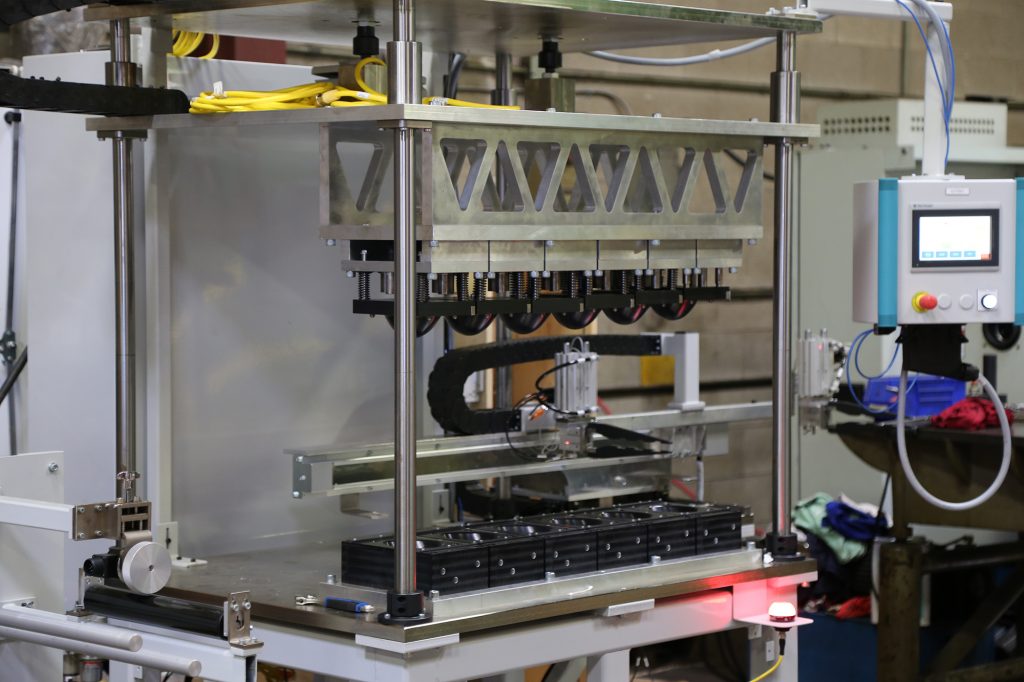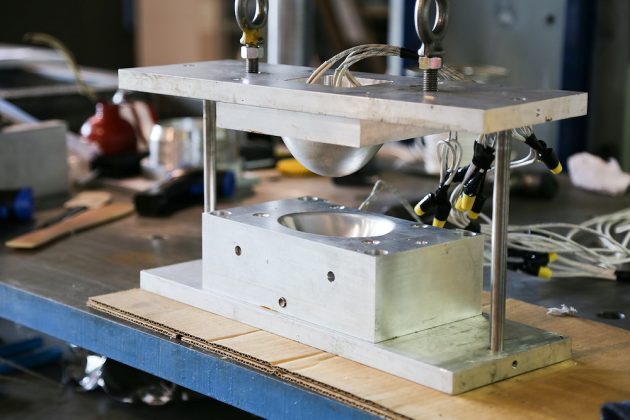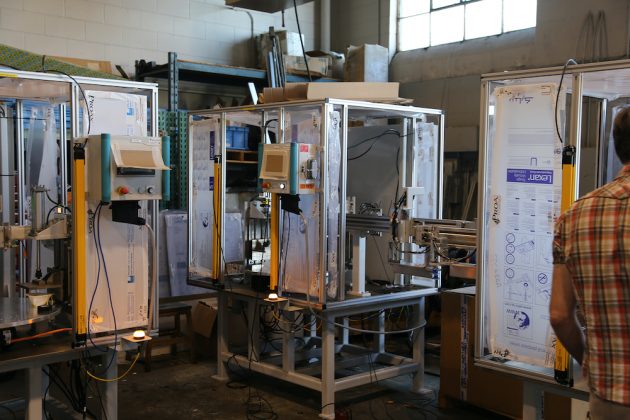
Making a mask: Machine builder develops N95 equipment for new PPE brand
September 18, 2020
By
Kristina Urquhart
An Ontario automation company has designed and built manufacturing equipment to help produce a new mask line and accelerate the availability of made-in-Canada PPE
 Harbour Technologies has created the first cup-style N95 machine in Ontario. Photo: ATMIS/Harbour Technologies
Harbour Technologies has created the first cup-style N95 machine in Ontario. Photo: ATMIS/Harbour Technologies When Andrew and David Glover, co-owners of the Harbour Technologies plant in Windsor Ontario, needed to outfit their employees with face masks in the early days of the pandemic, they ran into the same problem as almost every Canadian business, medical facility and government agency. There weren’t any to be had.
The brothers – who together run their family’s third-generation automation company – decided to take matters into their own hands and make the personal protective equipment (PPE) themselves. But some initial research showed the machines most often used to produce PPE originate in China.
Not only did that present bottlenecking issues at a time when the world was in lockdown, but those machines “had a lot of control systems that were obviously unique to the Chinese market,” says Andrew, “which would make it probably pretty difficult for manufacturing the PPE once we’d purchased that equipment.”
Harbour Technologies already does machine builds and tooling for the automotive, aerospace, oil and gas, and nuclear industries. So, the Glovers thought, why not build the PPE machines, too?
“We investigated designing our own equipment to North American standards – everything from the control systems and the PLCs to the safety systems [to what] would be more common in North America,” Andrew says.
Building an N95 machine
They began building prototype tooling to test fabric materials and filtration media for an N95-style mask. The N95 features a cup design that creates a better seal on the face than the centre-fold KN95 style – which is what makes it so sought-after for use in front-line health care, but more complicated to manufacture because the moulding and material assembly are completed separately.
The Harbour Technologies team developed several automated operations for the N95-style mask making, including a cup-moulding process that forms the inner shape of the mask, automated cutting of the mask’s inner filtration and outer spunbond materials, material welding to attach the cup to the filter and the outer material, and die cutting of the mask’s perimeter to provide optimal comfort against the end user’s face.
The masks then move on down the line to assembly of the aluminum nosepiece and ultrasonic welding of the elastic headbands, and finally to a vision system for quality checking.
Once the production line was built and operational, the company had the province’s only cup-type N95 mask machine (the other N95 machine operating in Ontario is for the pleated-type N95 masks).
It also had the means to create the PPE its staff sorely needed, the in-house capabilities – design, engineering, machining, manufacturing, production and fulfillment – to leverage that PPE into a full-scale brand, and the blueprint for N95 mask-making equipment that they could replicate for other Canadian manufacturers.
A new PPE company
As the Glovers were developing the machinery, they were approached by their friend Trevor Pare, a graphic design and marketing professional, to help scale up a new brand he was working on called ATMIS Protective Equipment, which would bring made-in-Canada PPE direct to consumers.
“The vision here was to create a name brand that people would be able to recognize and trust because it’s made here in Canada,” Trevor says. “People know where it’s coming from, and they know the people behind it.”
Harbour Technologies had the means to create the PPE its staff sorely needed, the in-house capabilities to leverage that PPE into a full-scale brand, and the blueprint for mask-making equipment that they could then replicate for other Canadian manufacturers.
ATMIS developed two disposable, civilian-use masks – the N95-style ATMIS C95 mask, and the surgical-style ATMIS C3. The C95 is built to the same specifications as an N95 mask and offers the same filtration properties, but ATMIS has not yet finished the certification and licensing process with Health Canada.
ATMIS also started designing a new style of face shield they called the ATMIS Sphere – lightweight and low profile, with a clear view the face.
The shield, engineered for civilians and those who work in non-medical settings, features scratch-resistant polycarbonate and an anti-fog coating. It sits on the face like safety glasses would, but offers the coverage and protection of a traditional face shield.
They’ve sourced North American–made materials where possible, such as made-in-Canada foam nosepieces for the shields and an option for filter material from the U.S. “Our systems are designed to be flexible to run different melt-blown filtration materials and thicknesses, allowing [us] to not be dependent on one material source,” explains Andrew.
Ramping up production
The Glovers are currently ramping up to a starting daily capacity of roughly 2,000 face shields, 9,000 N95-style masks and 22,000 surgical masks, all produced by a team of 25 people in Harbour Technologies’ 20,000-square-foot plant – though not for long.
ATMIS is already looking for a separate facility to house production and ramp up its workforce, extending to production staff, engineering, maintenance and quality control.
In addition to the equipment for masks and face shields – which will be shipping by mid-October and mid-November, respectively – the Harbour team has designed a robotic machine for manufacturing surgical gowns and is in talks with several Canadian manufacturers that are currently sewing gowns by hand.
“Building the machines, running them, doing the production and actually selling the product gives us a very significant advantage and allows us to scale a lot quicker,” says Trevor. “Scaling up our production might be as simple as getting [Harbour Technologies] to build another machine and bring it online, or looking at the existing machines that we have and finding efficiencies or other opportunities.”
“As production takes off, the demand is going to increase. We’re forecasting we will need more equipment [to be] built, but we’re also open to manufacturing equipment for other suppliers.”
ATMIS is pursuing large-scale contracts for its products, but also has found a niche for small businesses and consumers, who they say have been overlooked in the rush to manufacture PPE for front-line health-care workers.
“There’s a huge burden put on the Canadian industry that has to purchase PPE. It’s not just been about the shortage in the medical industry,” Andrew says.
Greenhouse growers, for example, who regularly use N95s to filter out spores, paid pre-COVID prices of 0.75 cents to $1.20 per N95 mask. Now those prices are $7.50 to $10 per mask – and they need hundreds a week. By comparison, ATMIS’ C95 masks will run approximately $1.50 to $3 per mask, depending on the amount ordered.
“If you make stuff in Canada, it might end up being a little bit more expensive to start. But in the long run, it’s a lot more advantageous because you can develop faster, you can make a better-quality product, you can have full control of your product,” says Trevor.
“There are not 100 different uncertainties and unknowns and possible delays like when you’re sourcing stuff overseas. What it boils down to is just smart business. And the Canadian consumer, they’re smart. They trust made-in-Canada quality products and that in itself is a premium.”
‘Open for business’
David Glover credits the Harbour Technologies’ industrial partners with helping to build or execute components for the equipment in short order, including panel building, pneumatics and ultrasonic welding.
This has helped to solidify ATMIS’ local supply chain, ensuring business continuity in the face of a second wave of coronavirus. He envisions a collaborative approach among manufacturers to further drive growth of made-in-Canada PPE equipment.
“As production takes off, the demand is going to increase. We’re forecasting we will need more equipment [to be] built, but we’re also open to manufacturing equipment for other suppliers,” he says.
“We’re not a closed door – so other medical suppliers that are looking for equipment, we’re happy to build it. And we’re happy to build custom equipment for them– if they have a unique design that they want to produce, we’re able to do that.”
In addition to the N95-making machine they built for ATMIS, Harbour Technologies is shipping three more N95 mahchines to other parts of Canada for production of the its clients’ own products.
“ATMIS and Harbour alone can’t produce all the PPE required in Canada ourselves,” David says. “We’re open for business.”
Advertisement
- CAMM, Automate Canada release statement on COVID-19, tariff dispute
- Founder of GM electric truck partner quits amid allegations


